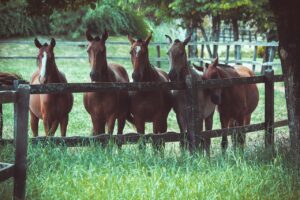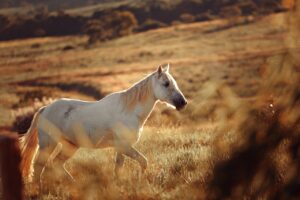FSB, Street No. 22, Punjab, Pakistan
Proper nutrition plays a crucial role in the overall health, well-being, and performance of high-performance horses. A well-balanced diet, tailored to meet the specific nutritional needs of these athletes, is essential for their success in various disciplines, such as racing, show jumping, dressage, and eventing. This article will discuss the key components of a high-performance horse’s diet, including forage, concentrates, supplements, and feeding strategies.
Forage:
Forage forms the foundation of a horse’s diet and should make up the majority of their daily intake. High-quality forage, such as good pasture or hay, provides essential nutrients, including fiber, vitamins, and minerals. Horses should have access to forage throughout the day to mimic their natural grazing behavior. The ideal forage source may vary based on factors like the horse’s age, activity level, and individual requirements.
Concentrates:
A high-performance horse’s diet frequently includes concentrates, like grains and pelleted meals, to add more energy and particular nutrients. The type and amount of concentrate needed depend on the horse’s workload and body condition. It’s crucial to choose concentrates formulated specifically for performance horses, as they contain higher levels of energy sources, such as fats and carbohydrates, along with protein and micronutrients.
Protein:
Protein is a vital nutrient for muscle development and repair, which is particularly important for high-performance horses. Good sources of protein include alfalfa, soybean meal, and other legume hays. While protein requirements vary based on the horse’s workload, a general guideline is to provide around 10-12% of the total daily ration as protein.
Fats and Carbohydrates:
For horses trained for high performance, fats, and carbs are crucial energy sources. Fats, such as vegetable oils and rice bran, are highly digestible and provide a concentrated source of energy. Including fats in the diet can help improve stamina and endurance. Carbohydrates, derived from grains like oats and barley, are readily available sources of energy but should be fed in moderation to prevent digestive upset and metabolic issues.
Vitamins and Minerals:
Vitamins and minerals are necessary for various physiological processes in the horse’s body. While forage and concentrates provide some essential nutrients, additional supplementation may be required, depending on individual needs and the quality of the forage. A balanced vitamin and mineral supplement specifically formulated for performance horses can help ensure adequate levels of these nutrients are met.
Electrolytes:
Electrolyte supplementation is vital for high-performance horses, especially during periods of intense exercise or hot weather. Electrolytes help maintain proper hydration and balance essential minerals lost through sweat. The horse’s feed can be supplemented with commercially available electrolyte solutions, or they can be given in a different water source.
Feeding Strategies:
Feeding high-performance horses requires careful consideration of their workload and schedule. It’s important to divide their daily intake into multiple small meals to mimic their natural grazing behavior. Feeding before or after exercise can help provide fuel and aid in recovery. Additionally, ensuring access to fresh, clean water at all times is crucial for proper hydration.
Individual Considerations:
Each high-performance horse is unique, and their nutritional requirements may vary. A diet plan should take age, breed, body condition, metabolism, and special discipline into account. Regular monitoring of body weight, condition, and performance, along with consultation with a qualified equine nutritionist or veterinarian, can help tailor the diet to meet the individual needs of the horse.
Hydration:
Proper hydration is crucial for high-performance horses to maintain optimal health and performance. Horses should have access to clean, fresh water at all times, especially during exercise and hot weather. Adequate water intake helps regulate body temperature, supports digestion, and prevents dehydration, which can lead to reduced performance and potential health issues.
Feeding Frequency:
High-performance horses benefit from frequent, smaller meals throughout the day rather than one or two large meals. This feeding approach mimics their natural grazing behavior, allowing for better digestion and utilization of nutrients. Dividing the daily ration into multiple feedings also helps prevent digestive upset and reduces the risk of colic.
Body Condition Scoring:
Regular monitoring of a horse’s body condition is essential to ensure they are receiving appropriate nutrition. Body condition scoring involves assessing the horse’s overall body fat coverage and muscle development. It helps determine if adjustments need to be made in the diet to maintain an ideal body condition, which can vary depending on the discipline and individual horse.
Weight Management:
Maintaining an optimal weight is crucial for high-performance horses. Weight issues can affect a horse’s agility and stamina, and the latter might leave them without the energy they need to put forth their best efforts. Adjustments to the food and feeding regimen can be made by monitoring weight and physical condition to achieve and maintain the horse’s ideal weight.
Feeding Before and After Exercise:
Providing a small meal before exercise can supply the necessary energy for optimal performance. After exercise, a post-workout meal helps replenish energy stores and aids in muscle recovery. This meal should include a balance of carbohydrates, protein, and electrolytes.
Avoiding Excessive Grain Intake:
While concentrates are important for providing energy, excessive grain intake can lead to issues such as digestive upset, laminitis, and metabolic disorders. Emphasizing forage as the primary source of nutrition is essential.
Quality and Consistency of Feed:
The quality of feed, including forage and concentrates, directly impacts the nutritional value and digestibility. It is important to source high-quality hay or pasture and choose concentrates from reputable manufacturers that formulate their feeds specifically for high-performance horses. Consistency in the feed type and brand helps maintain digestive health by minimizing abrupt dietary changes.
Consideration for Individual Needs:
Each high-performance horse is unique, and their nutritional requirements may vary. Factors such as age, breed, metabolism, pre-existing conditions, and specific discipline should be considered when developing a nutrition plan. Some horses may require specialized diets or additional supplementation to address specific needs, such as joint support or coat condition.
Monitoring and Adjusting the Diet:
Regular monitoring of a high-performance horse’s body condition, weight, and performance is essential. The diet can be adjusted as necessary by assessing these elements and consulting with a skilled equine nutritionist or veterinarian. It guarantees that the nutritional needs of the horse are met and supports long-term health and performance.
Conclusion:
In conclusion, providing proper nutrition for high-performance horses involves a well-balanced diet consisting of high-quality forage, appropriate concentrates, targeted supplementation, and mindful feeding practices. Individual needs, hydration, weight management, and regular monitoring play a crucial role in maintaining optimal health, stamina, and performance. By prioritizing their nutritional requirements, owners and trainers can support the overall well-being and success of their high-performance equine athletes.
Proper nutrition is paramount for the health and performance of high-performance horses. A well-balanced diet that includes high-quality forage, appropriate concentrates, targeted supplementation, and proper feeding strategies is essential. By providing the necessary nutrients, energy, and hydration, horse owners and trainers can optimize the performance and well-being of their high-performance equine athletes.
It is important to remember that the information provided in this article is a general guideline and should not replace professional advice. A consultation with an equine nutritionist or veterinarian who can examine your high-performance horse’s individual demands is strongly advised. Regular monitoring of the horse’s body condition, weight, and performance is crucial to ensure that the diet is meeting their individual requirements.
By implementing a comprehensive nutrition plan that takes into account the specific demands of high-performance horses, owners, and trainers can support their horses’ optimal health, stamina, and performance. A well-fed and properly nourished horse is more likely to excel in their chosen discipline and achieve their full athletic potential.
A Look at Backyard Horse Keeping




